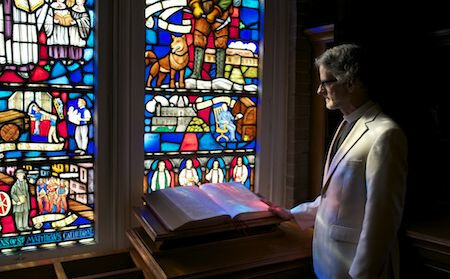Sight Limits

“I love the fog,” a friend was saying on a recent morning. He said it reminds us of how little we can really see—until God lifts us up to himself.
Some researchers are now saying that our non-visual senses (touch, smell, hearing, tasting) have withered on account of the prevalence of artificial light. If you were a retailer of meat or vegetables in a city, say, 200 years ago, you would be at a wholesale market every day long before dawn, obtaining your goods to sell later that day. There was no artificial light to help you (candles would have been far to expensive, and not a lot of good anyway). You would touch and smell the goods on offer and be able, through those other senses, to pick out which products were the best quality.
We are almost never in the dark anymore, so we don’t know how to use the non-visual senses.
---
The Bible carries on an extended polemic against trusting in our sight. Vision is what leads people to turn away from God to the idols. So it starts in Genesis: God creates light on the first day, but he doesn’t create sun and moon until the fourth day. And even then, the text refrains from calling them by those names, “sun” and “moon,” perhaps on account of the pagans worshiping sun and moon as gods. Rather, Genesis demotes them further, not only down to the fourth day, but also calling them merely “the greater light” and “the lesser light.” The message for the careful reader is clear: these “lights” are not divine and are not the most trustworthy things.
When Samuel is looking over the sons of Jesse, trying to discern which one God wants to be king, Samuel is impressed by their looks. But God tells him that he, God, does not see as man sees; he does not look on the outward appearance, but on what is interior.
So—clinching the point, in my view—when God reveals himself to the latter prophets, he does so by his Word. “The Word of the Lord came to me,” a prophet may say: it is a word that comes, and thus precisely something that must be listened to.
Of course, there are visions, such as the famous one of Isaiah 6 from which we get the Sanctus (“Holy, holy, holy”). God still uses vision to reach us. And we are promised that, someday, the blessed will see him face to face. May we be in their number! And in the meantime, may we learn the lesson of the fog.
---
Out & about. “Strange but True Things about God” is my current class at Incarnation, 3966 McKinney, Dallas. This week’s topic is freedom, namely, how God causes our free actions without thereby making them any less free. The class meets at 10:20 a.m. on Sundays in the education building, room 119, through February 5.
You may listen to last week’s class here.
On Tuesday, January 24, I will be speaking at Annunciation Greek Orthodox Church in Buffalo, N.Y., on Losing Susan. The event begins at 7 p.m. More info here.
And speaking of Losing Susan, the paperback edition is to be released next month.


